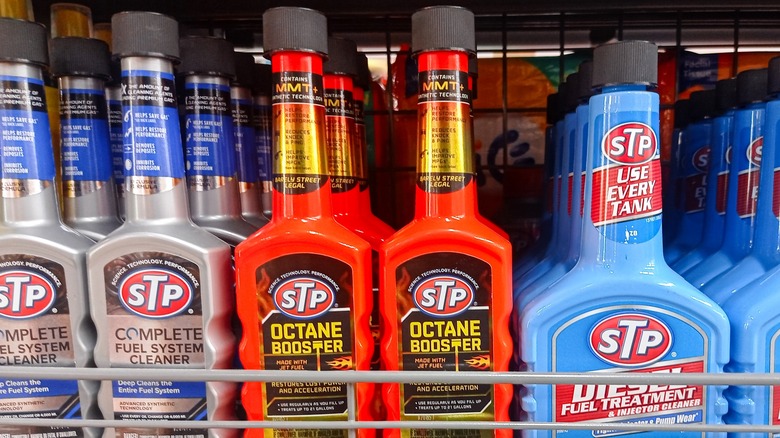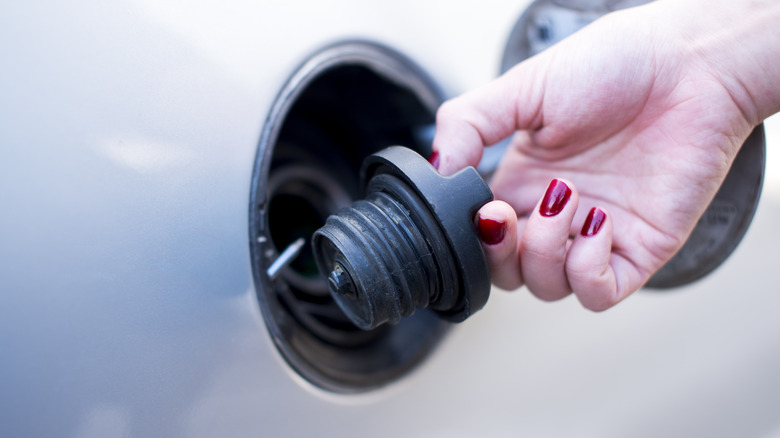What Does Octane Booster Do For Your Engine And Is It Worth Using?
For automobile owners looking for ways to get maximum performance out of their vehicle, there is no particular shortage of options that can ensure your engine is, as the saying goes, "firing on all cylinders." Thankfully, not all of those options involve making extensive, and likely expensive, upgrades to a vehicle's under-the-hood components. In fact, you may be able to elevate the performance of your car with the help of an engine additive, such as an octane booster.
If you're not familiar with what an octane booster is, the performance enhancing fluid is an additive that is designed to be poured directly into your vehicle's fuel tank. Once added, the booster mixes with the power-giving fluid therein to increase its octane rating. An octane rating is the primary measure of a fuel's stability, and is determined by judging how much pressure is required for a fuel to spontaneously combust within an internal combustion engine. As the science dictates, fuels boasting higher numbers are generally more stable, and increased stability at combustion phase should result in increased engine efficiency.
If you purchase regular gasoline when you stop off at a filling station, you may be able to reap the same sort of benefits by simply purchasing a higher octane gasoline when you fill up your tank. But if you've checked the prices of premium gasoline lately, you know that may not be a financially responsible course of action, and premium gasoline may not even provide the benefits you're looking for.
Is Octane Booster worth using?
Given the potential impact of switching to a higher octane gasoline, opting for a booster might seem the smarter way to go – particularly since you can purchase octane booster for as little as four dollars these days. The only issue is that once you start using an octane booster, you'll need to continue to use it if you hope to keep reaping its benefits, with recommendations being that you add it to your fuel tank every time you top it off. So, the question quickly becomes whether or not octane booster is actually worth using.
The answer to that query falls into "eye of the beholder" territory, as only you can decide if using an octane booster is worth your time, effort, and money. However, a few intriguing facts might sway your decision. For instance, octane boosters have legitimately been proven to do what they claim, and as higher octane ratings can translate to better combustion, your engine should produce more power, and potentially even see increased fuel efficiency. Moreover, some octane boosters can even help clean your engine's combustion chamber and fuel lines, as well as limit pesky problems like knock, ping, and hesitation.
Those same issues can be addressed by performing regular engine care on your automobile, which will also help ensure your car, truck, or SUV is operating at peak capacity. Given the relative ease involved in adding an octane booster to your fuel, it may well be worth adding it to your overall engine care regimen.
Care should be taken when using Octane Booster
Despite the potential benefits of using an octane booster, there is a school of thought that believes they are not entirely necessary for everyday driving, and best utilized in high-performance vehicles that are regularly driven hard. On top of that, most automotive professionals might agree that, even as easy as octane boosters are to use, care should be taken when adding them to your fuel, as using them incorrectly may have a negative impact on your engine.
Some of the factors you'll need to consider before adding octane booster to your fuel mix is whether your vehicle's engine will actually benefit from it, as well as how much of the booster you use. Regarding the latter factor, pouring the correct amount of octane booster to your fuel tank may prove vital, as adding too much can result in deposits that damage components like engine cylinders as well as pistons, injectors, and fuel filters. You can likely determine the correct levels of octane booster to add to your fuel tank by reading the instructions on the label of the bottle.
Similarly, you should consult your vehicle's owner's manual to determine what level of octane its engine is designed for, as it may actually receive no practical benefit from the octane boost. Likewise, there are types of octane boosters out there that have not been authorized for road use, as they may contain Methylcyclopentadienyl Manganese Tricarbonyl (aka MMT), an additive that can produce metallic oxides proven to have a negative impact on human health and the environment. So, please read up on brands before you buy.


